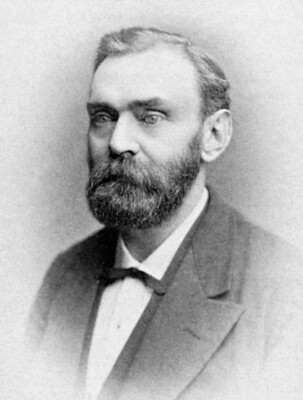Alfred Nobel

Biography
Alfred Nobel is remembered as one of history’s most influential inventors, industrialists, and philanthropists. Best known as the creator of the Nobel Prizes, Nobel’s legacy continues to impact science, literature, and peace efforts worldwide.
Early Life
Alfred Nobel was born in Stockholm, Sweden, on October 21, 1833. Raised in a family of engineers, Nobel was exposed to scientific and technical pursuits from an early age. His father, Immanuel Nobel, was an inventor and engineer whose work took the family to Saint Petersburg, Russia, where Alfred received a cosmopolitan education. He was proficient in several languages, including Swedish, Russian, English, French, and German.
Career and Inventions
Alfred Nobel’s professional life was marked by innovation and entrepreneurship. He is most famous for inventing dynamite in 1867, a breakthrough that revolutionized construction, mining, and demolition industries. Nobel held over 350 patents in his lifetime and established more than 90 factories in 20 countries. His business ventures included explosives manufacturing and chemical engineering, making him a significant figure in the industrialization of the 19th century.
Despite the commercial success of dynamite, Nobel was mindful of its destructive potential. This concern played a pivotal role in shaping his later philanthropic efforts.
The Nobel Prizes and Philanthropic Legacy
In his will, Alfred Nobel dedicated the majority of his wealth to the establishment of the Nobel Prizes. First awarded in 1901, the Nobel Prizes honor outstanding achievements in Physics, Chemistry, Medicine, Literature, and Peace. The prizes have recognized pioneers such as Marie Curie, Martin Luther King Jr., and Malala Yousafzai, reflecting Nobel’s enduring commitment to progress and humanitarian values.
Nobel’s vision for the awards was clear: to reward those who confer the “greatest benefit to humankind.” Today, the Nobel Prizes remain among the most prestigious honors across the globe.
Personal Life and Character
Alfred Nobel never married and was known for his reserved, introspective nature. He enjoyed literature and poetry, even publishing his own works. Nobel’s friendships with luminaries such as Bertha von Suttner, a prominent peace activist and Nobel Peace Prize laureate, influenced his views on pacifism and social responsibility.
Achievements and Major Impact
- Invented dynamite and other explosives
- Held over 350 patents
- Established the Nobel Prizes, impacting science, culture, and peace
- Founded factories and laboratories in more than 20 countries
Legacy and Influence
Alfred Nobel’s legacy endures through the Nobel Foundation and the annual prizes that bear his name. His life’s work bridges science, industry, and humanitarianism, making him a central figure in modern history. To learn more about other notable scientists and inventors, explore profiles such as Marie Curie and Thomas Edison.
Conclusion
Alfred Nobel’s life demonstrates how innovation, when guided by conscience, can change the world. His contributions to science and society continue to inspire generations, underscoring the lasting power of ideas and philanthropy.
Detailed Information
| Full Name | Alfred Bernhard Nobel |
| Gender | Male |
| Marital Status | Unmarried |
| Father | Immanuel Nobel |
| Mother | Andriette Ahlsell Nobel |
| Siblings | Robert Nobel,Ludvig Nobel,Emil Nobel |
| Education | Private tutors, Studied chemistry and engineering |
| Years Active | 1850–1896 |
| Known For | Inventing dynamite, Establishing the Nobel Prizes |
| Major Achievements | Invented dynamite, Established the Nobel Prizes, Held over 350 patents |
| Income Sources | Inventions, Patents, Industrial enterprises |